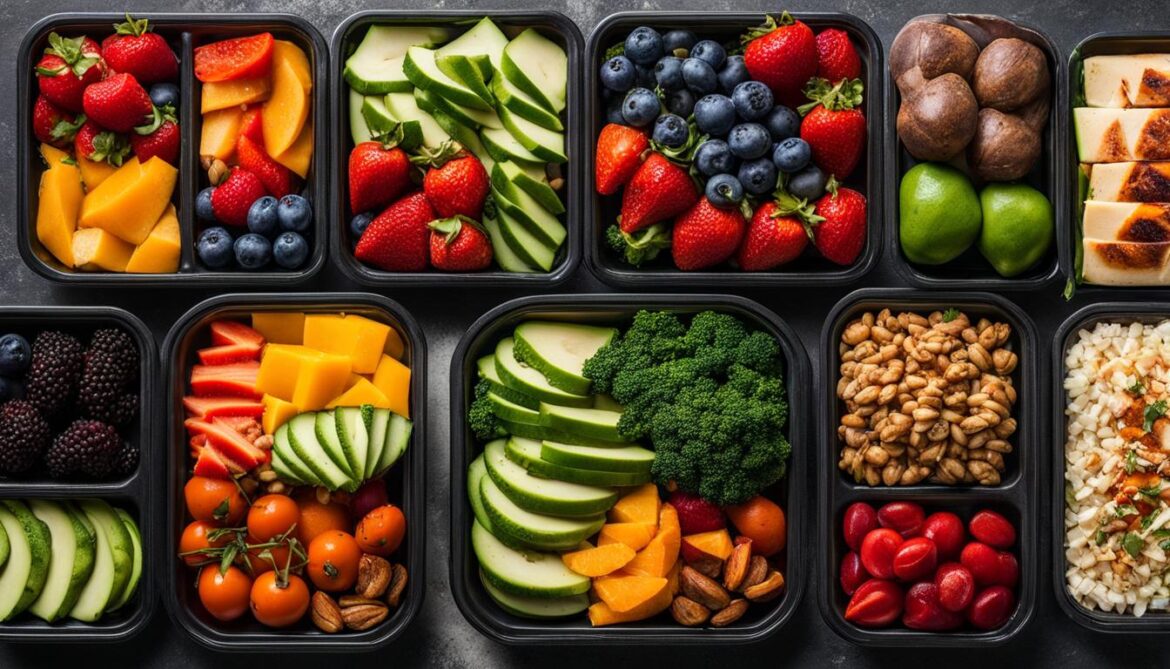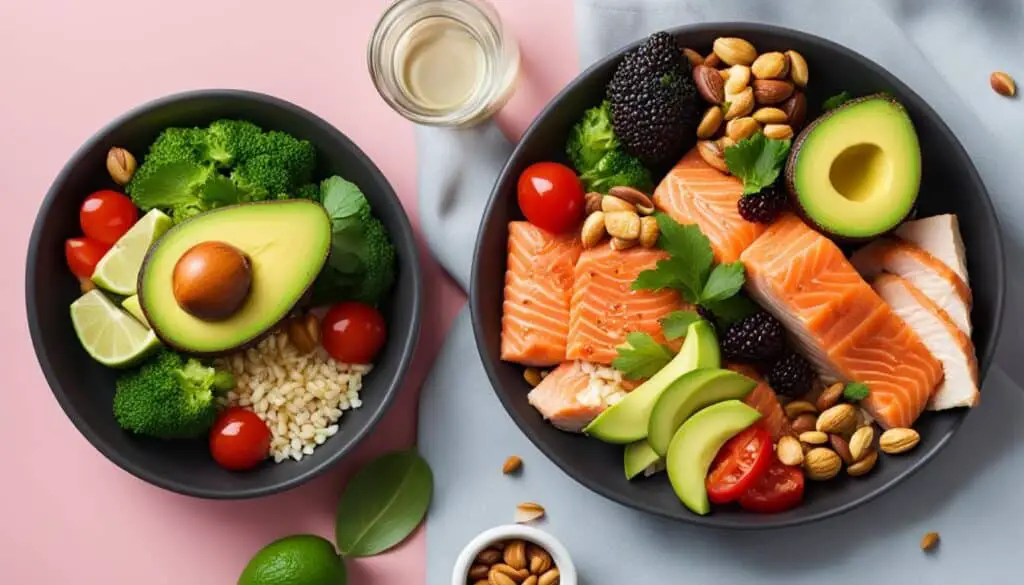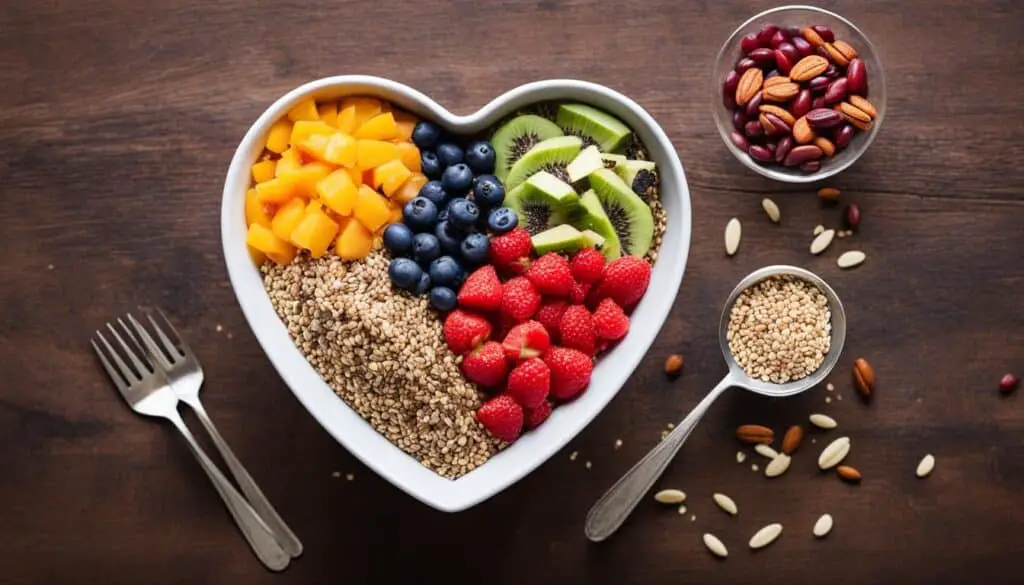When it comes to maintaining a healthy weight and promoting heart health, a low-cholesterol meal prep can be instrumental. Following a nutritious diet that focuses on incorporating heart-healthy ingredients can not only support weight loss but also reduce the risk of heart disease. One person who can testify to the effectiveness of such a meal plan is renowned Michelin star chef Sat Bains.
Sat Bains, known for his exquisite culinary creations, experienced a wake-up call when he suffered a heart attack. Determined to make a change for the better, he revamped his diet to a low-cholesterol one. By incorporating vegetables, fruit, oats, barley, beans and pulses, extra virgin olive oil, nuts and seeds, lean meats, and spices and herbs into his meal prep, Sat Bains successfully improved his health while maintaining his Michelin star standards.
Now, let’s take a closer look at why the key ingredients in a low-cholesterol meal prep are essential for weight loss and heart health.
Key Takeaways
- A low-cholesterol meal prep can support weight loss and promote heart health.
- Renowned Michelin star chef Sat Bains adopted a low-cholesterol diet after experiencing a heart attack.
- Key ingredients in a heart-healthy meal prep include vegetables, fruit, oats, barley, beans and pulses, extra virgin olive oil, nuts and seeds, lean meats, and spices and herbs.
The Importance of Fruits, Vegetables, and Fibrous Foods
Incorporating fruits, vegetables, and fibrous foods into your low-cholesterol meal prep is essential for heart health. These foods not only offer a plethora of important nutrients but also help manage cholesterol levels, promoting overall cardiovascular well-being.
When it comes to heart-healthy vegetables, consider including fibrous options such as artichokes, broccoli, asparagus, and peppers in your meals. These vegetables are not only delicious but also packed with vitamins, minerals, and dietary fiber that support a healthy heart.
Oats and barley, two cherished grains, contain a special type of soluble fiber known as beta-glucan. This soluble fiber helps reduce cholesterol levels and lowers the risk of heart disease. So, a serving of oatmeal or a side of barley pilaf can make an excellent addition to your low-cholesterol meal prep.
Another fantastic addition to a heart-healthy meal plan is beans and pulses. Lentils, chickpeas, and other legumes are excellent sources of plant-based protein and fiber. They can provide a significant boost of satiety and contribute to your overall heart health.
“Including a variety of fruits, vegetables, and fibrous foods in your low-cholesterol meal prep can significantly improve your heart health and overall well-being. These foods not only nourish your body but also help manage cholesterol levels, supporting better cardiovascular health.”
Now, let’s take a look at a table that highlights some heart-healthy fruits and vegetables:
| Fruits | Benefits |
|---|---|
| Apples | Rich in antioxidants and dietary fiber, which can help lower cholesterol levels. |
| Berries | Loaded with vitamins, minerals, and antioxidants that support heart health. |
| Oranges | Packed with vitamin C and fiber, contributing to a healthy heart. |
| Avocados | Contain heart-healthy monounsaturated fats and fiber. |
| Kale | High in vitamins, minerals, and antioxidants that promote heart health. |
By including these fruits and vegetables in your low-cholesterol meal prep, you can maximize your heart health benefits and enjoy a diverse and delicious array of flavors.
Next, we will explore the importance of selecting healthy fats and proteins for a balanced and heart-healthy diet.
Choosing Healthy Fats and Proteins
When following a low-cholesterol meal prep, it’s important to choose healthy fats and lean proteins to support heart health and maintain a balanced diet. Michelin star chef Sat Bains, who prioritized his well-being after suffering a heart attack, made the switch from a high-fat keto diet to one that incorporated more fruits, vegetables, and lean protein sources. This change allowed him to focus on consuming “good fats” and reducing cholesterol levels.
Healthy fats, such as those found in extra virgin olive oil, offer numerous cardiovascular benefits. They contain monounsaturated fats that can help lower bad cholesterol levels and reduce the risk of heart disease. Including these fats in your low-cholesterol meal prep is a great way to enhance both flavor and health benefits.
In addition to oils, nuts and seeds are excellent sources of healthy fats that can be included in a heart-healthy diet. They provide essential nutrients, including omega-3 fatty acids, which promote heart health and reduce inflammation. Incorporating a variety of nuts and seeds, such as almonds, walnuts, chia seeds, and flaxseeds, into your meals and snacks can contribute to a nutritious and satisfying low-cholesterol meal plan.
When selecting lean proteins, it’s essential to opt for options that are low in cholesterol. Sat Bains chose to incorporate lean meats like fish, venison, and game birds into his diet. These protein sources are not only low in cholesterol but also provide essential nutrients such as omega-3 fatty acids and high-quality protein. Including a variety of lean meats in your low-cholesterol meal prep can help meet your protein needs while promoting heart health.
| Healthy Fats | Lean Proteins |
|---|---|
| Extra virgin olive oil | Fish (salmon, tuna, trout) |
| Nuts (almonds, walnuts, pistachios) | Venison |
| Seeds (chia, flaxseeds, sesame seeds) | Game birds (chicken, turkey) |
Choosing healthy fats and lean proteins is a vital component of a low-cholesterol meal prep aimed at maintaining heart health. Incorporating extra virgin olive oil, nuts, and seeds into your meals provides cardiovascular benefits and essential nutrients. Opting for lean meats like fish, venison, and game birds ensures you consume high-quality protein while minimizing cholesterol intake. By making conscious choices in your meal planning, you can promote a heart-healthy lifestyle and enjoy delicious, nutritious meals.
The Role of Whole Grains and Soluble Fiber
Whole grains and soluble fiber are key components of a heart-healthy, low-cholesterol meal prep. Incorporating these nutritious foods into your diet can help manage cholesterol levels and promote overall cardiovascular health.
The Benefits of Whole Grains
Whole grains, such as oats, barley, brown rice, quinoa, and whole wheat bread, are rich sources of fiber, vitamins, and minerals. They provide essential nutrients that support heart health and contribute to a well-rounded diet.
Whole grains contain beta-glucan, a type of soluble fiber, which has been shown to decrease LDL cholesterol levels and reduce the risk of heart disease.
Including whole grains in your low-cholesterol meal plan can help regulate blood sugar levels, improve digestion, and promote satiety, which can aid in weight management.
The Power of Soluble Fiber
Soluble fiber is a type of fiber that dissolves in water and forms a gel-like substance in the digestive tract. It helps lower cholesterol levels by binding to cholesterol molecules and preventing their absorption into the bloodstream.
By incorporating soluble fiber into your diet, you can effectively reduce LDL cholesterol, also known as “bad” cholesterol, and improve heart health.
Along with whole grains, other excellent sources of soluble fiber include fruits, vegetables, legumes, and nuts. By including a variety of these foods in your low-cholesterol meal prep, you can maximize the benefits of soluble fiber.
| Whole Grains | Soluble Fiber-Rich Foods |
|---|---|
| Oats | Citrus fruits |
| Barley | Apples |
| Brown rice | Strawberries |
| Quinoa | Carrots |
| Whole wheat bread | Legumes (beans, lentils) |
By incorporating these foods into your low-cholesterol meal prep, you can enhance the flavors and textures of your meals while reaping the many health benefits they offer.
Next, we’ll explore heart-healthy superfoods that can further enhance your low-cholesterol meal prep and contribute to overall well-being.
Superfoods for Heart Health
When it comes to maintaining a heart-healthy diet, incorporating superfoods into your low-cholesterol meal prep can make a significant difference. These nutrient-dense foods pack a powerful punch of essential vitamins, minerals, and antioxidants that benefit your heart and overall well-being. Let’s explore some of the top superfoods that can boost heart health and enhance your low-cholesterol meal plan.
Nuts and Seeds
Nuts and seeds are nutritional powerhouses that provide a rich source of healthy fats, fiber, and various heart-protective nutrients. Incorporating walnuts, almonds, chia seeds, flaxseeds, and pumpkin seeds into your meals can help improve heart health. These superfoods are low in saturated fats and high in monounsaturated and polyunsaturated fats, which can help lower cholesterol levels when consumed as part of a balanced diet.
Oily Fish
Include oily fish like salmon, mackerel, and sardines in your low-cholesterol meal plan to benefit from their omega-3 fatty acids. Omega-3s have been shown to reduce inflammation, lower blood pressure, and decrease the risk of heart disease. These heart-healthy fats help maintain optimal heart function and promote overall cardiovascular health.
Shellfish
Shellfish like shrimp, crab, and lobster are not only delicious but also offer several nutritional benefits. They are low in saturated fat and are a rich source of omega-3 fatty acids and lean protein. Including shellfish in your diet can support heart health by reducing cholesterol levels and providing essential nutrients that contribute to overall well-being.
Spices and Herbs
Spices and herbs not only add flavor to your low-cholesterol meal prep but also provide heart-healthy benefits. Turmeric, ginger, cinnamon, garlic, and oregano are just a few examples of spices and herbs that have been shown to have cholesterol-lowering and anti-inflammatory properties. Including these flavorful ingredients in your dishes can enhance heart health and contribute to a well-rounded and nutritious diet.
By incorporating these heart-healthy superfoods into your low-cholesterol meal prep, you can enjoy a delicious and nutritious diet while promoting cardiovascular well-being. Experiment with different recipes and combinations to create meals that are both satisfying and beneficial for heart health.
Addressing Gut Health and Inflammation
Gut health and inflammation are crucial factors that impact overall well-being. When the gut lining becomes permeable, known as leaky gut syndrome, it allows harmful substances to enter the bloodstream, leading to inflammation and various symptoms. To address this issue and promote a healthy gut microbiome, incorporating specific foods in your low-cholesterol meal prep can make a significant difference.
One way to support gut health is by including probiotic-rich foods in your diet. These foods contain beneficial bacteria that help restore and maintain the balance of your gut microbiota. Yogurt and sauerkraut are excellent sources of probiotics and can be enjoyed as part of your low-cholesterol meal plan. These fermented foods not only provide gut-friendly bacteria but also offer additional nutritional benefits.
To further promote a healthy gut, incorporating prebiotic-rich foods is equally important. Prebiotics are a type of fiber that nourishes the beneficial bacteria in your gut, allowing them to thrive. Bananas and onions are examples of prebiotic-rich foods that can support a healthy gut microbiome. Including these foods in your low-cholesterol meal prep can help create a favorable environment for your gut health.
“By incorporating probiotics and prebiotic-rich foods in my low-cholesterol meal prep, I have seen improvements in my overall well-being,” shares Sat Bains, Michelin star chef who prioritizes his health after a heart attack.
A low-cholesterol meal prep that includes fiber-rich fruits, vegetables, and whole grains can also contribute to gut health and reduce inflammation. These foods provide essential nutrients and promote a healthy digestive system. Including a variety of colorful fruits and vegetables in your meals can provide antioxidants and phytochemicals that support gut health and reduce inflammation.
By paying attention to your gut health and incorporating these strategies into your low-cholesterol meal prep, you can support a healthy gut microbiome, reduce inflammation, and promote overall well-being.
Quick and Easy Low-Cholesterol Meal Prep Ideas
Planning and preparing low-cholesterol meals doesn’t have to be complicated. With these quick and easy meal prep ideas, you can stick to a heart-healthy diet without spending hours in the kitchen. Here are some delicious recipes that incorporate nutritious ingredients and can be prepared in a short amount of time:
1. Chicken Stew with Cumin and Paprika
Enjoy the warmth and comfort of a flavorful chicken stew infused with aromatic spices. This quick and easy recipe combines tender chicken, wholesome vegetables, and a blend of cumin and paprika for a satisfying low-cholesterol meal. Serve it with a side of whole grain bread for a complete and nourishing dish.
2. Vegetarian White Bean Potpie with Kale
Elevate your low-cholesterol meal prep with this hearty and nutritious vegetarian potpie. Packed with protein-rich white beans, vibrant kale, and a savory herb-infused filling, this recipe is a delicious twist on a classic comfort food. With a flaky whole wheat crust, it’s a satisfying and heart-healthy option for any meal.
3. Taco Sweet Potato Shepherd’s Pie with Black Beans
Put a Mexican-inspired twist on a traditional shepherd’s pie with this flavorful and easy-to-make dish. The combination of spicy taco seasoning, creamy sweet potatoes, and hearty black beans creates a delicious and nutritious low-cholesterol meal. Top it with a sprinkle of fresh cilantro and serve it alongside a crisp green salad.
4. Tomato Cream Sauce with Chickpeas and Spinach
Indulge in the rich and creamy flavors of a tomato cream sauce without worrying about cholesterol. This quick recipe combines tangy tomatoes, protein-packed chickpeas, and nutrient-rich spinach for a satisfying and heart-healthy pasta dish. Serve it over whole wheat pasta for a complete and wholesome meal.
| Recipe | Preparation Time | Servings |
|---|---|---|
| Chicken Stew with Cumin and Paprika | 30 minutes | 4 |
| Vegetarian White Bean Potpie with Kale | 45 minutes | 6 |
| Taco Sweet Potato Shepherd’s Pie with Black Beans | 40 minutes | 4 |
| Tomato Cream Sauce with Chickpeas and Spinach | 20 minutes | 4 |
These quick and easy low-cholesterol meal prep ideas prove that eating heart-healthy doesn’t have to be complicated or time-consuming. By incorporating nutritious ingredients and flavors into your meals, you can enjoy delicious dishes while taking care of your heart.
Conclusion
Following a low-cholesterol meal prep is key to achieving weight loss and promoting heart health. By incorporating a variety of fruits, vegetables, whole grains, lean proteins, and healthy fats into your daily diet, you can effectively manage cholesterol levels and reduce the risk of heart disease.
Additionally, paying attention to gut health and inflammation is crucial for overall wellbeing. Including probiotic-rich foods like yogurt and sauerkraut, as well as prebiotic foods like bananas and onions, can support a healthy gut microbiome and reduce inflammation.
By adopting these nutritional strategies, you can create a satisfying and nutritious meal plan that not only helps you achieve your weight loss goals but also protects your heart. Remember to consult with a healthcare professional or registered dietitian to personalize your low-cholesterol meal prep for optimal results.
FAQ
What changes did Michelin star chef Sat Bains make to his diet?
Sat Bains switched to a low-cholesterol diet and focused on incorporating vegetables, fruit, oats, barley, beans and pulses, extra virgin olive oil, nuts and seeds, lean meats, and spices and herbs.
Which fibrous vegetables are good for a healthy heart?
Fibrous vegetables that are good for a healthy heart include artichokes, broccoli, asparagus, and peppers.
How can oats and barley help lower cholesterol?
Oats and barley contain beta-glucan, a type of soluble fiber that can help lower cholesterol levels.
What are some examples of lean proteins recommended for a low-cholesterol diet?
Lean proteins recommended for a low-cholesterol diet include fish, venison, and game birds that are low in cholesterol.
How do whole grains and soluble fiber contribute to heart health?
Whole grains like brown rice, quinoa, and whole wheat bread provide fiber and nutrients that help manage cholesterol levels and promote heart health.
What are some superfoods for heart health?
Superfoods for heart health include nuts and seeds, oily fish, shellfish, and spices and herbs.
How can gut health and inflammation be addressed?
Gut health and inflammation can be addressed by incorporating probiotics found in fermented foods and prebiotic-rich foods into a low-cholesterol meal prep.
What are some quick and easy low-cholesterol meal prep ideas?
Some quick and easy low-cholesterol meal prep ideas include chicken stew with spices, vegetarian white bean potpie with kale, taco sweet potato shepherd’s pie with black beans, and tomato cream sauce with chickpeas and spinach.
Source Links
- https://www.eatingwell.com/sneaky-signs-of-leaky-gut-syndrome-8421526
- https://www.eatingwell.com/skillet-dinner-recipes-with-beans-8423026
- https://www.dailymail.co.uk/femail/article-12919205/Im-Michelin-star-chef-gorged-liked-heart-attack-10-foods-saved-life.html



